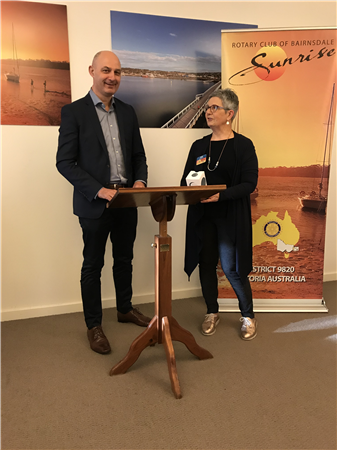Chris is a local, who grew up in this area and has worked here in various capacities for many years (his first job being as an engineer with Alan Cross). Despite suffering from seasickness, he took on the role of CEO of Gippsland Ports (GP) about 12 months ago, and loves it.
GP employs about 60 people, including the harbourmaster at Port Welshpool, and covers the coast from Mallacoota to Inverloch. It is responsible for about 50% of the state’s wharves and other coastal infrastructure.
It is funded by the State Government, with extra funding for the dredge Tommy Naughton, which keeps the entrance open – with some difficulty during recent weather events. There is no recurrent funding for rebuilding infrastructure. Chris is hoping for some funding from Boating Victoria. Rock walls are going to require replacement in the next few years, at a cost of $30-50 million.
A lot of their work involves installation and maintenance of navigation aids throughout the waterways, and Chris is proud of their excellent service, providing real time access to information from these aids to the boating public. They also run a smaller dredge for upkeep of the lake channels around Lakes Entrance.
Cattle from King Island and Flinders Island are off loaded at Port Welshpool, where the harbourmaster is challenged by the safety concerns of recreational boats around a big commercial ferry. Chris showed an image of the long jetty at Port Welshpool, which is used for walking and fishing – very impressive.
Gippsland Ports is responsible for berths and moorings, with a new marina installed at Lakes Entrance recently. They assist with the jetties at LEFCOL, which are in need of replacement.
Destination jetties are critical to tourism, but generate no income. GP is responsible for water pollution and safety at Bastion Point, but not its upkeep. They help with waterway event management, and help minimise the costs to organisers by, for example, supplying barges for the Lakes Entrance fireworks.
Design and construction staff are employed to build and maintain infrastructure, and have their own excavators, pile drivers etc. They supply on-water refuelling infrastructure, and pump-out sewerage facilities.
One of the important functions is marine incident response, with prevention of oil spillage and salvage the main focus, and management of derelict vessels before they disintegrate and cause pollution. They also patrol over the summer with Vic Police, educating waterway users and checking compliance. They don’t board vessels, for safety reasons.
Gippsland Ports provides vessel maintenance infrastructure and service, with slip yards and a 100 ton capacity lift at Lakes Entrance and 40 ton at Paynesville.
They also supply specialized in-house training of their personnel and contractors, including life jacket training – to be avoided in the colder months!
Sue Roberts thanked Chris for the talk and commented on the impressive diversity of responsibilities.

